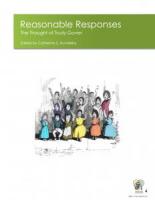Reasonable Responses: The Thought of Trudy Govier
Synopsis
This tribute to the breadth and influence of Trudy Govier’s philosophical work begins with her early scholarship in argumentation theory, paying special attention to its pedagogical expression. Most people first encounter Trudy Govier’s work and many people only encounter it through her textbooks, especially A Practical Study of Argument, published in many editions. In addition to the work on argumentation that has continued throughout her career, much of Govier’s later work addresses social philosophy and the problems of trust and response to moral wrongs. The introduction by Catherine Hundleby situates Govier’s research along the path of her unusual academic life.
While following the timeline of Govier’s research publication, in this collection the authors build on her work and suggest certain new connections between her argumentation theory and social philosophy. A Practical Study of Argument, first published in 1985, situates Govier among a distinct segment of informal logicians whose concerns about teaching reasoning to post-secondary students orient their research, Takuzo Konishi argues. Moira Kloster evaluates Govier’s progress in the challenge of providing critical thinking education to diverse and changing social contexts. Shifting gears to social philosophy but still addressing education, Laura Elizabeth Pinto explores the significance of Govier’s work on trust for explaining the problem of “audit culture” for teaching. At the centre of this volume, social philosophy receives an abstract meta-ethical defense from Linda Radzik.
Moving solidly into the domain of normative social philosophy, Alice MacLachlan reconsiders Govier’s condemnation of revenge by viewing it as a form of moral address, but she notes how revenge as an act of communication contrasts with argumentation in lacking the respect that Govier maintains is intrinsic to argumentation. MacLachlan ultimately agrees that revenge is morally indefensible. The practical challenges of addressing others in the aftermath of wrongdoing, especially in public contexts, can make it difficult to distinguish between victims and combatants or wrongdoers, Alistair Little and Wilhelm Verwoerd explain, and Kathryn Norlock argues that forgiveness is psychologically vexed too. People may recognize transformation to be in principle possible for all people, Norlock argues, and yet we may find the evidence regarding some particular evildoer sufficient to count that person as an exception. Finally Govier responds to the various papers.
Chapters
-
Introduction
-
Where Practical Activity Meets Theoretical Excitement: A Rhetorical History of Trudy Govier’s Contribution to the Informal Logic Movement
-
The Practical Teaching of Argument
-
Erosion of Trust in Education: Accountability and Teacher Professionalism
-
Relationships and Respect for Persons
-
Private and Public: Practitioner Reflections on Forgiveness and Reconciliation
-
Giving Up, Expecting Hope, and Moral Transformation
-
Response to My Commentators
-
“Hello. My Name is Inigo Montoya”: Revenge as Moral Address


